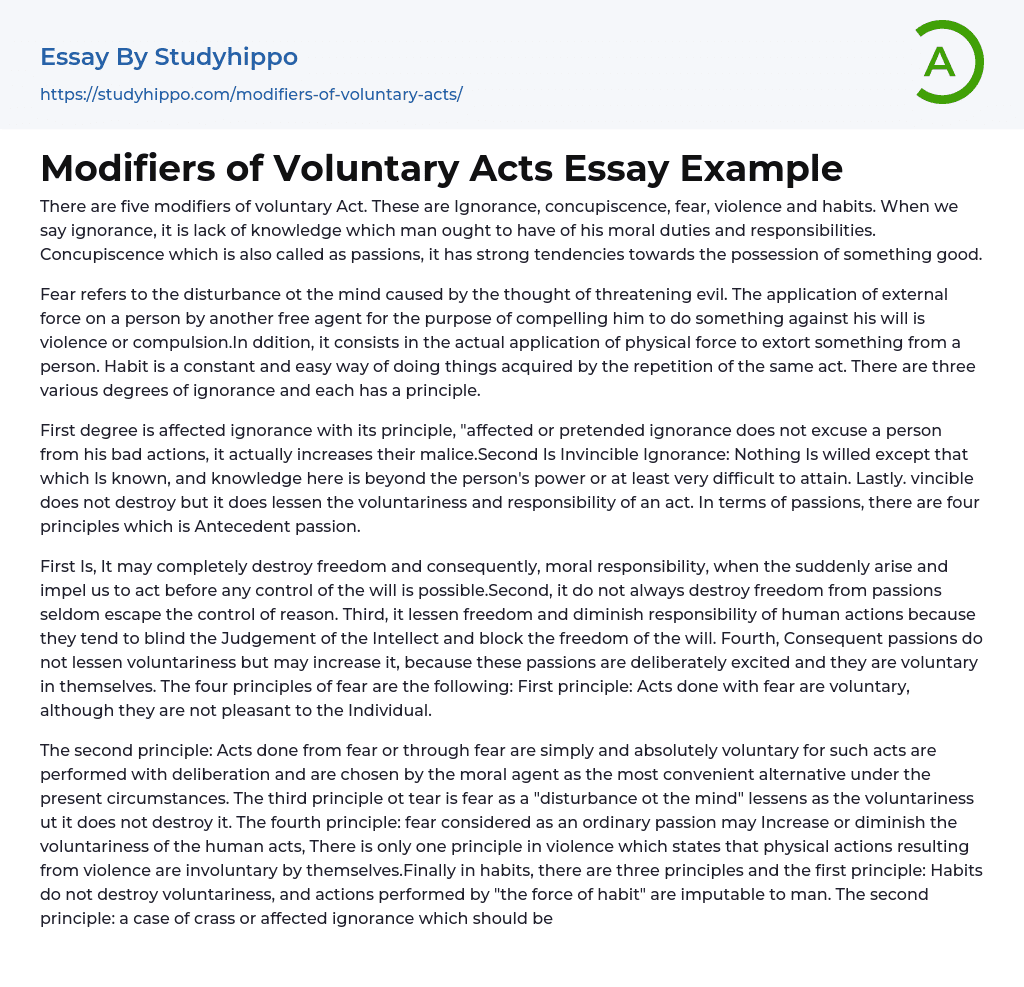There are five modifiers of voluntary Act. These are Ignorance, concupiscence, fear, violence and habits. When we say ignorance, it is lack of knowledge which man ought to have of his moral duties and responsibilities. Concupiscence which is also called as passions, it has strong tendencies towards the possession of something good.
Fear refers to the disturbance ot the mind caused by the thought of threatening evil. The application of external force on a person by another free agent for the purpose of compelling him to do something against his will is violence or compulsion.In ddition, it consists in the actual application of physical force to extort something from a person. Habit is a constant and easy way of doing things acquired by the repetition of the same act. There are three various degrees of ignorance and each has a principle.
...
First degree is affected ignorance with its principle, "affected or pretended ignorance does not excuse a person from his bad actions, it actually increases their malice.Second Is Invincible Ignorance: Nothing Is willed except that which Is known, and knowledge here is beyond the person's power or at least very difficult to attain. Lastly. vincible does not destroy but it does lessen the voluntariness and responsibility of an act. In terms of passions, there are four principles which is Antecedent passion.
First Is, It may completely destroy freedom and consequently, moral responsibility, when the suddenly arise and impel us to act before any control of the will is possible.Second, it do not always destroy freedom from passions seldom escape the control of reason. Third, it lessen freedom and diminish responsibility of human actions because the
tend to blind the Judgement of the Intellect and block the freedom of the will. Fourth, Consequent passions do not lessen voluntariness but may increase it, because these passions are deliberately excited and they are voluntary in themselves. The four principles of fear are the following: First principle: Acts done with fear are voluntary, although they are not pleasant to the Individual.
The second principle: Acts done from fear or through fear are simply and absolutely voluntary for such acts are performed with deliberation and are chosen by the moral agent as the most convenient alternative under the present circumstances. The third principle ot tear is fear as a "disturbance ot the mind" lessens as the voluntariness ut it does not destroy it. The fourth principle: fear considered as an ordinary passion may Increase or diminish the voluntariness of the human acts, There is only one principle in violence which states that physical actions resulting from violence are involuntary by themselves.Finally in habits, there are three principles and the first principle: Habits do not destroy voluntariness, and actions performed by "the force of habit" are imputable to man. The second principle: a case of crass or affected ignorance which should be Judged accordingly. The last principle of fear: if an evil abit has been contracted but a positive effort is being made to contract it the act from new entry proceeding from new habit are considered Involuntary.
These are all of the principles of each modifier of the voluntary acts and their corresponding positions.Modifiers of Voluntary Acts By pranklamb There are five modifiers of Voluntary Act. These are ignorance, concupiscence, fear, refers to the disturbance of
the mind caused by the thought of threatening evil. The is invincible ignorance: Nothing is willed except that which is known, and knowledge here is beyond the person's power or at least very difficult to attain. Lastly, vincible ignorance:"lt does not destroy but it does lessen the voluntariness and responsibility passion.First is, it may completely destroy freedom and consequently, moral human actions because they tend to blind the Judgement of the intellect and block Acts done with fear are voluntary, although they are not pleasant to the individual.
principle of fear is fear as a "disturbance of the mind" lessens as the voluntariness passion may increase or diminish the voluntariness of the human acts. There is only from new entry proceeding from new habit are considered involuntary.
- Population essays
- Cultural Assimilation essays
- Demography essays
- Ethnographic essays
- Population Growth essays
- Boo Radley essays
- Genesis essays
- Richard iii essays
- Alice in Wonderland essays
- On the road essays
- Ozymandias essays
- The Nightingale essays
- Holden Caulfield essays
- Animal Farm essays
- 1984 essays
- A Hanging essays
- Shooting An Elephant essays
- A Tale Of Two Cities essays
- Adventures Of Huckleberry Finn essays
- Arthur Conan Doyle essays
- Brave New World essays
- Characters In Hamlet essays
- Characters In Romeo And Juliet essays
- Desdemona essays
- Diary Of A Wimpy Kid essays
- First-Person Narrative essays
- Frankenstein essays
- Heart Of Darkness essays
- Jane Eyre essays
- Jay Gatsby essays
- King Duncan essays
- Librarian essays
- Little Red Riding Hood essays
- Lord Of The Flies essays
- Silas Marner essays
- The Cask Of Amontillado essays
- The Catcher In The Rye essays
- The Crucible essays
- The Handmaid's Tale essays
- The Reader essays
- Virgil essays
- Wuthering Heights essays
- Candide essays
- Castle essays
- J. D. Salinger essays
- Ulysses essays
- Ethan Frome essays
- In Cold Blood essays
- Outliers essays
- Tuesdays With Morrie essays




